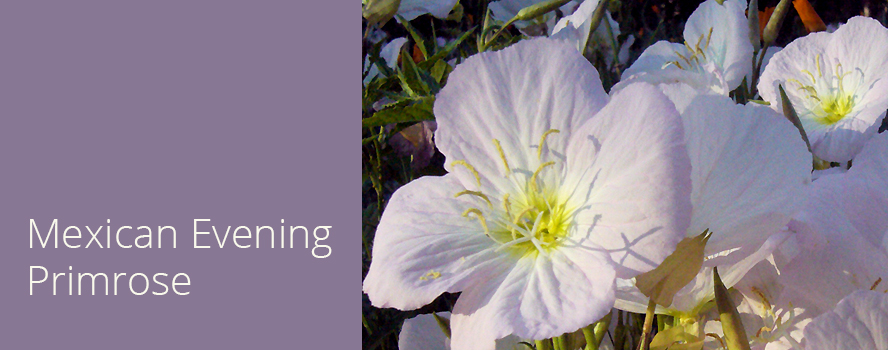Oenothera speciosa—a Drought Tolerant Perennial Ground Cover
by Helga George, Ph.D.
The Mexican Evening Primrose is a flowering drought resistant plant that will quickly spread to be a perennial ground cover with no additional watering in some desert or prairie regions.
With ground water supplies diminishing in much of the country, there is great interest in flowering plants that will thrive with minimal water. Oenothera speciosa is such a plant. Especially in areas that receive solely winter and spring rains, it will bloom profusely from the spring into the summer with no additional water. More commonly known as the Mexican evening primrose, this species can grow so well as a perennial ground cover that it should be planted in a contained area, lest it spread too widely.
Drought Tolerant Growth of the Mexican Evening Primrose
Oenothera speciosa grows across much of the United States, including all of the southern states. It grows as far north as Pennsylvania and Iowa. It requires full sun to bloom and will tolerate most types of soil. Being native to the grasslands of Mexico and the American South West, the Mexican evening primrose is adapted to dry regions that receive infrequent rain. An additional feature of the plants is that they are highly deer resistant.
This species of Oenothera grows well in climates that only receive rain in the winter and spring, such as southern California. It quickly spreads to form a perennial ground cover. Without supplemental water, it will bloom from spring into the summer. If watered occasionally during the summer, the Mexican evening primrose will flower throughout the summer and into the fall. When not supplied with water during the summer, the plants will go dormant and revive when the rains come.
This drought tolerant plant does not require fertilization and should be cut back in the fall after the stems have died off. The Mexican evening primrose grows so well under drought conditions that it can spread and be invasive. The plants can spread up to three feet (0.9 meter) by rhizomes. They are best grown in areas where their growth can be limited, such as in strips by curbs or in parking lot planters.
Oenothera speciosa has Beautiful Flowers
The plants generally have two inch (five cm) flowers and grow under one foot (0.3 meter) tall. The flowers are either white or pink, depending on the variety and location of Oenothera speciosa. In the southern portion of their range, the flowers of the original species start as white, then turn pink as they age. They become less pink in the northern part of the United States.
White varieties include ‘Alba’ that is pure white. ‘Woodside White’ is white, but has chartreuse in its center. Two pink cultivars are ‘Rosea’ that is light pink and ‘Siskiyou’ that has bright pink flowers. Despite its name and unlike other species of Oenothera, the Mexican evening primrose blooms during the day in the southern part of its range. Plants in the northern part of its range are like the other Oenothera species and open in the evenings. The flowers can be half their normal size under conditions of drought.
The Mexican Evening Primrose is Easy to Care For
The Mexican evening primrose is a highly attractive drought resistant perennial ground cover. There are varieties that produce white or pink flowers. The plants bloom from the spring into the fall with only minimal watering. Care should be taken to plant Oenothera speciosa where it will not be at risk of spreading and becoming invasive.
Sources:
Brenzel, Kathleen Norris, editor. 2007. Sunset Western Garden Book. Sunset Publishing, Menlo Park, CA.
Lady Bird Johnson Wildflower Center. “Oenothera speciosa Nutt.” The University of Texas at Austin. wildflower.org, accessed July, 2010
USDA Natural Resources Conservation Service. “Plants Profile: Oenothera speciosa Nutt. pinkladies.” usda.gov., accessed July, 2010
QUICK LINKS TO ALL
Suite.io Articles
by Helga George, Ph.D.
AGRICULTURAL SCIENCE
• Polyphenol Oxidase Enzymes Cause Browning of Fruits and Vegetables
CHEMICAL ECOLOGY
• Domoic Acid Poisoning in Sea Lions
• Insects that Make Cyanide
PLANT PATHOLOGY
• Plants Produce Chemicals as a Defense Against Pathogens
• Wheat Rust Threatens World’s Wheat Crops
• Biotrophic Versus Necrotrophic Fungi
• Fungal Haustoria Absorb Nutrients from Living Plant Cells
• The Gene-for-Gene Concept: a Central Tenet in Plant Pathology
GARDENING
• Oenothera speciosa—a Drought Tolerant Perennial Groundcover
• The Magic Lily—a Drought Tolerant Species of Lycoris
SOIL MICROBIOLOGY
• Streptomyces, Antibiotics, and Microbial Conflict in the Soil
AGRICULTURE IN SANTA BARBARA COUNTY
• Chrysanthemum White Rust Outbreak in Southern California

